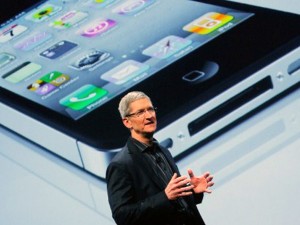SAN FRANCISCO—The death of Apple visionary Steve Jobs has left huge shoes to fill, with successor Tim Cook inheriting a company with fabulous products but also facing unrelenting assault from agile competitors.
Analysts said that for the short term, new chief executive Cook has inherited a strong, highly profitable company and has the skills to keep it going.
But whether he has the ability to match Jobs’s acumen at picking winners in the consumer electronics market over the long term — Jobs’ genius that turned Apple into the world’s most valuable firm at one point — will be a question held over his head for years to come.
“Steve is too big a personality and too amazing of a businessman for him not to be missed,” Gartner analyst Van Baker said, just hours before Jobs’ death was announced.
“But the wheels aren’t going to come off; a lot of Steve’s qualities are embedded in the Apple culture.”
“While Mr. Jobs’ passion, creativity, and keen eye for consumer preference will be missed, we believe Jobs and Apple’s executive team have built an unparalleled talent base and corporate culture that sets the table for future success and innovation,” said Michael Walkley at broker Cannacord Genuity.
The company’s share price fell slightly on Thursday, closing down 0.23 percent at $377.37. But the seesaw trading during the day, down one percent, then up 1.7 percent, then back down again, testified to investor nervousness over the way forward under Cook.
Brokers said Jobs’ departure was already anticipated. Visibly weaker in appearance earlier this year after a lengthy fight with pancreatic cancer, he finally resigned as chief executive in August, leaving Cook as his hand-picked successor.
His legacy is huge. Company management experts have long identified Jobs with a rare skill of choosing the products and product attributes that consumers will want.
The list of his successes includes Mac computers, iPods, iPhones, iPads, and the operating systems behind them that, while not as widespread as rival Microsoft’s, are revered in high-performance devices and considered worth the premium price.
Independent Silicon Valley analyst Rob Enderle called Jobs “the ultimate product tester.”
“Everything went through him,” Enderle said just before Jobs’ death. “As more products come out over time, they will have less of his handprint on them.”
A consummate marketer as well, Jobs garnered regular standing ovations at conferences where he introduced the company’s newest product, including the latest version of the iPad in March this year and the iCloud cloud computing service in June.
Thirteen-year Apple veteran Cook, by comparison, underwhelmed in his launch of a new iPhone Tuesday: many fans believed there would be an all-new fifth generation version, but it turned out to be a modified iPhone 4, dubbed the 4s, and the company’s shares were sold off.
But analysts said the 4s smartphone was a strong improvement and should fly off the shelves, and gave Cook a solid grade.
While not identified as much with creating winning products, Cook’s talents could prove as essential in the future as extremely agile competitors get powerful rivals to Apple products to the market more and more quickly.
He has worked behind the scenes outsourcing manufacturing and coordinating distribution to ensure new iPods, iPhones, iPads and Macintosh computers do not grow stale in warehouses.
He is also credited with shrewdly negotiating deals for components that kept down costs and fattened profit margins.
Cook “is well qualified for his new role as CEO and has at his disposal a deep and talented executive team in the areas of supply chain management, hardware/software design and product marketing,” said Canaccord’s Walkley.
“I don’t think Apple’s lost their mojo at all,” Gartner’s Baker told AFP after the iPhone 4s launch.
“All of this brouhaha will blow over, probably about the time they see people are buying a gazillion of the iPhones,” he continued.
Tech analyst Shaw Wu of Sterne Agee agreed that the company’s future remains bright.
“The iPhone and iPad are still relatively early in their adoption curve. And there are still untapped markets like broadcast television and streaming video.”
